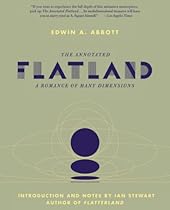 In Edwin A. Abbott’s novella Flatland, A Square explains to the three-dimensional world how he lives in Flatland, his world of two dimensions. When a sphere visits his world, his familiar, customary world is upset.
In Edwin A. Abbott’s novella Flatland, A Square explains to the three-dimensional world how he lives in Flatland, his world of two dimensions. When a sphere visits his world, his familiar, customary world is upset.
Although I had read Flatland a decade ago, I recalled none of the details and greatly enjoyed reading it again. It was an intriguing look at a world where geometry directly impacted daily life; it expanded my conceptions of dimension in my own three-dimensional world. What would a fourth dimension be like? I cannot comprehend.
As the Introduction instructed me, much of Flatland was a social commentary on Victorian England: it is a satire. I defined satire a few weeks ago, and yet I somehow missed it in this book. I just kept thinking “How dare he suggest that women are just straight lines?!” Duh! He’s pointing out the flaws of his current society by creating a ridiculous society. If you are interested in Victorian England, his commentaries are quite interesting; for me, the introduction and accompanying notes helped me make sense of some of it. For that reason, I recommend reading a version with notes or an extended introduction to help clarify Abbott’s purposes.
What is Flatland about? At first glance, it is about geometry and dimensions. But upon closer reading, we see that it is a commentary on discrimination and close-mindedness. It mocks religious close-mindedness as well as Victorian ideals of science and mathematics. It mocks class discrimination and gender discrimination.
The first portion of Flatland seemed slow to me: Square was telling about his society and explaining the history of his two-dimensional land. The second half of the story was much more interesting, for a sphere visited him. How does a sphere prove a third dimension to a person living only in the second dimension?
In the end, however, Flatland was a fascinating look at how I am limited in my understanding because I am only three-dimensional. I also am close-minded because of those limits.
Who What When Where Why
In sum:
Who? A Square, his pentagon sons, his straight line wife, his triangle servants, and a sphere
What? A Square in Flatland learns of the third dimension by being introduced to Pointland (no dimensions), Lineland (two dimensions), and ultimately Spaceland (three dimensions)
When? In an evening in the 2000 year of his era
Where? In his hall and in Spaceland
Why? Because once every 1000 years, a Sphere from Spaceland can appear to a being in Flatland to expound the Doctrine of the Third Dimension
Have you read Flatland? Did you realize it was a satire of Victorian England? What did you think of it?
Other Reviews:
If you have reviewed Flatland on your site, leave a link in the comments and I’ll add it here.





This book sounds really cool and like a lot of fun. One of my personal reading quirks, is that I like reading things that remind us that it’s impossible to conceive of certain concepts/experiences as we really have no basis for comparison. For a class I once had to read an article called “What it’s like to be a bat”, which was essentially arguing that because a bat’s perceptual system is nothing like our, it’s brain is nothing like ours, as humans, we can never really understand what it’s like to be like them. Their experience is nothing like ours in such an extreme way that the only way we can try to understand it is to view it through our own constraints and constructs which really aren’t valid for a bat. All of this is to say that your review of this book reminds me of that article, and I think I would enjoy reading this one! Thanks for the recommendation!
Steph, yes it does that: a new way of looking at my own world and realizing that there is probably another dimension I’m missing. I hope you enjoy it if you do read it!
I don’t think I’ve ever even heard of it before but it does sound different!
I’ve never heard of this but I love satire. I loved Gulliver’s Travels.
Ladytink, it is different, but it’s good!
Chain Reader, I haven’t read Gulliver’s Travels yet, but it’s on my list for this year!
hi my name is rhebekka. i just finshed flatland and is writeing a review for my lit teacher (im in 9th grade). i wanted to find out if abbott said for real that flatland was a satire! but i cant find it any where. therfore, that means what if he really what he said?
Hi Rhebekka! I don’t know if Abbott said himself it was satire, but since there are no worlds of squares and lines, I think we can only assume Abbott is telling us something about Victorian society itself!
The lengthy discussion in the introduction also talked about how it is satire. I don’t have it anymore (it was a library book) but maybe your copy has a similar discussion! I wish you well in your homework assignment.
Hi I am in the 7th grade and have recently just finished this book for my reading class. I enjoyed it very much exept for the first half which I ended up reading three times before i finaly understood what he was talking about and how it linked to other societys. this book is very interesting and I hope more people will read this book.
I agree that the beginning was definitely slow. I fell asleep four times getting through it. But when the story got started, it was definitely interesting. The way it noted how close-minded the characters were really related to society today as well. I mean, today we’ll sit here and expound on how people in the past were immoral, stupid, etc. (like the way A Square kept trying to convince the Line World King that there was a better world out there) and yet we never stop to think of how future generations will laugh at what we do now.